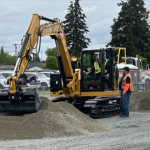Balancing act: Construction worker’s guide to mental well-being
In the realm of construction, the focus often lies on physical prowess and technical skills. However, amidst the clang of hammers and the whirr of machinery, it’s crucial not to overlook the mental well-being of those tirelessly working to build our cities and structures. The construction industry, like any other, can present its fair share of challenges that may impact mental health. From long hours and physically demanding tasks to the pressure to meet deadlines, it’s easy for stress to build up.
whirr of machinery, it’s crucial not to overlook the mental well-being of those tirelessly working to build our cities and structures. The construction industry, like any other, can present its fair share of challenges that may impact mental health. From long hours and physically demanding tasks to the pressure to meet deadlines, it’s easy for stress to build up.
So, how can construction workers navigate these challenges while maintaining their mental well-being? Here’s a comprehensive guide:
Embrace Open Communication
Communication is the cornerstone of any successful project. In addition to discussing project plans and safety protocols, it’s essential to foster an environment where workers feel comfortable discussing their mental health. Encourage open dialogue about stressors and concerns, whether it’s through regular check-ins or dedicated support channels.
Prioritize Breaks and Rest
Construction work is demanding, both physically and mentally. Encourage workers to take regular breaks throughout the day to rest and recharge. Whether it’s a quick stretch, a short walk, or a moment of meditation, these breaks can help alleviate stress and prevent burnout.
Foster a Supportive Culture
Building camaraderie among team members can go a long way in promoting mental well-being. Encourage a supportive culture where workers look out for one another and offer assistance when needed. Simple gestures like lending a listening ear or providing encouragement can make a world of difference.
Provide Access to Resources
Ensure that workers have access to resources and support services for mental health. This could include employee assistance programs, counseling services, or educational materials on stress management and coping strategies. By providing these resources, you demonstrate a commitment to prioritizing mental well-being within the organization.
Encourage Work-Life Balance
Maintaining a healthy work-life balance is essential for overall well-being. Encourage workers to set boundaries between work and personal life, and support them in taking time off when needed. Recognize the importance of downtime in preventing burnout and fostering long-term job satisfaction.
Promote Positive Coping Strategies
In high-stress environments, it’s easy to turn to unhealthy coping mechanisms like substance abuse or avoidance. Instead, promote positive coping strategies such as exercise, mindfulness, and hobbies outside of work. Encourage workers to find activities that bring them joy and relaxation, helping them better manage stress in a healthy way.
Lead by Example
As a leader or supervisor, your behavior sets the tone for the work environment. Lead by example by prioritizing your own mental well-being and demonstrating healthy coping strategies. Show empathy and understanding towards your team members, and encourage a culture of openness and support.
Celebrate Achievements
In the fast-paced world of construction, it’s easy to focus solely on the next project or deadline. Take the time to celebrate achievements and milestones along the way. Whether it’s completing a project ahead of schedule or achieving a safety milestone, recognizing and celebrating these accomplishments boosts morale and reinforces a sense of pride in the work.
Taking care of mental health in the construction industry is not only possible but essential for long-term success. By prioritizing open communication, fostering a supportive culture, and promoting positive coping strategies, construction workers can thrive both on and off the job site. With these strategies in place, we can build not only stronger structures but also healthier and happier communities.








